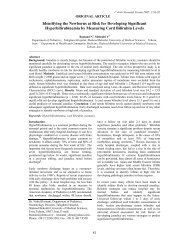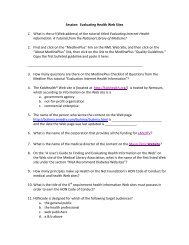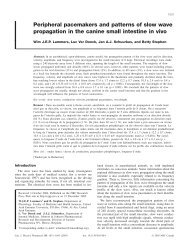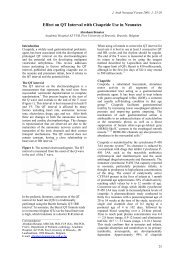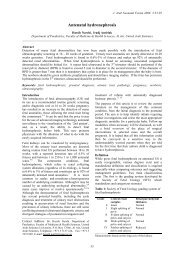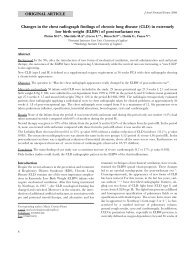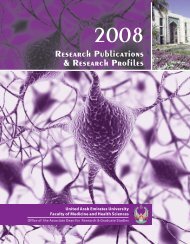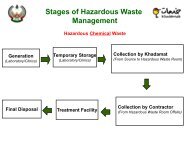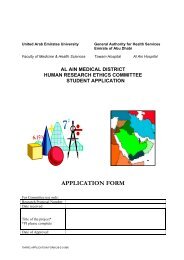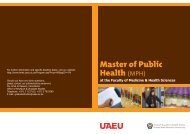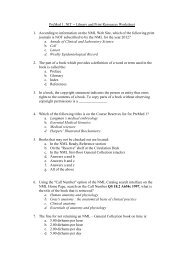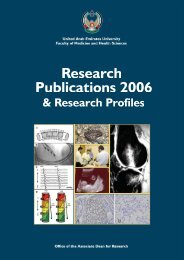Community Medicine Abstracts - College of Medicine and Health ...
Community Medicine Abstracts - College of Medicine and Health ...
Community Medicine Abstracts - College of Medicine and Health ...
You also want an ePaper? Increase the reach of your titles
YUMPU automatically turns print PDFs into web optimized ePapers that Google loves.
Project No. 251 (2009)Knowledge, attitude <strong>and</strong> practice <strong>of</strong> unpasteurized milk consumption amongstwomen in Al Ain, UAEStudent Authors: Shaikha Sulaiman Ahmed Al Houqani, Salwa Saeed Mohammed AlKaabi, Ahlam Abdulghafoor Mohamed Al Awadi,Maryam Ali Bati Al Qaydi, Fatima YousifMohamed Ismail, Zainab Ahmed Husain BaqerFaculty Supervisors: Dr. I. Blair, Pr<strong>of</strong>. N. NagelkerkeAbstract:Introduction: Unpasteurized milk consumption has become a “trendy” notion amongnatural food proponents. Interestingly enough, this budding notion <strong>of</strong> promoting it inwestern countries has always been a traditional practice in the Arab states <strong>and</strong>southern Asian societies. In the United Arab Emirates, for example, unpasteurized milkconsumption is embraced as an integral part <strong>of</strong> the local food habits. The currentstudy aims to assess <strong>and</strong> subsequently minimize unpasteurized milk consumption as ahigh risk behavior among citizens <strong>of</strong> Al Ain District.Methods: The study was carried out amongst female attendees <strong>of</strong> the Al Markhania<strong>and</strong> Al Hayer Family Development Foundation (FDF) branches in Al Ain District. A total<strong>of</strong> 246 participants were included. Self-administered questionnaires <strong>of</strong> 34 items wereused <strong>and</strong> results were analyzed using SPSS statistical s<strong>of</strong>tware. For the backgroundinformation gathering, the investigators addressed the following governmentalagencies: Al Ain Municipality, Al Ain Veterinary Services (AVS), Abu Dhabi FoodControl Authority (FCA), Al Ain Preventive <strong>Medicine</strong> Department (PMD), <strong>and</strong> TawamHospital Microbiology Laboratory.Results: Two hundred <strong>and</strong> forty six responses were included in the analysis. Twentypercent <strong>of</strong> the sampled population was drinking unpasteurized milk. Of the nonconsumers,86% knew someone else who practices unpasteurized milk consumptionlike parents, gr<strong>and</strong>parents <strong>and</strong> siblings. Sixty three percent <strong>of</strong> the consumers hadtheir own farms as a source <strong>of</strong> unpasteurized milk. Unfortunately, <strong>of</strong> those only 56%reported annual screening <strong>of</strong> their animals for infections. Camel raw milk wasconsumed by 67.5% <strong>of</strong> the consumers. The epidemiological factor that was associatedwith raw milk consumption was being UAE national. Knowledge score was significantlydifferent between consumers <strong>and</strong> non-consumers. Variables that influenced theknowledge score were: age, area <strong>of</strong> residency (urban versus rural) <strong>and</strong> educationallevel.Conclusion: We can conclude from this study that unpasteurized milk consumption is acommon practice among the locals in our representative sample. The demographicpr<strong>of</strong>ile <strong>of</strong> this practice is crossing all age groups, educational levels, areas <strong>of</strong> residency<strong>and</strong> financial income. Factors contributing to consumption were inherited distortedknowledge <strong>and</strong> attitude towards the risks <strong>and</strong> benefits <strong>of</strong> unpasteurized milkconsumption.



